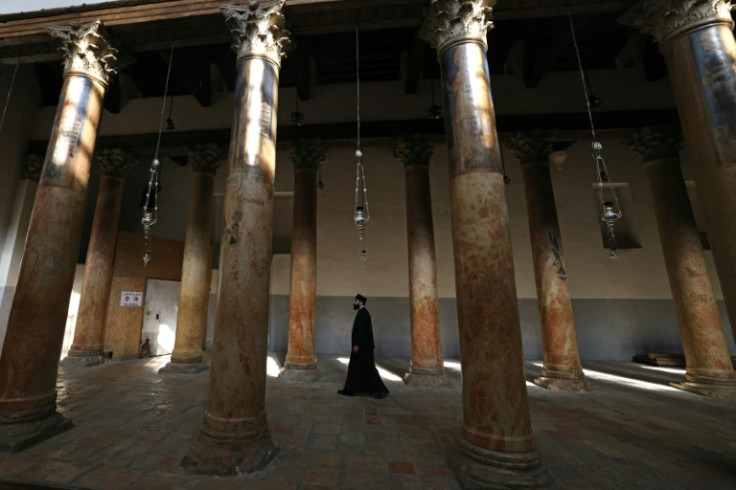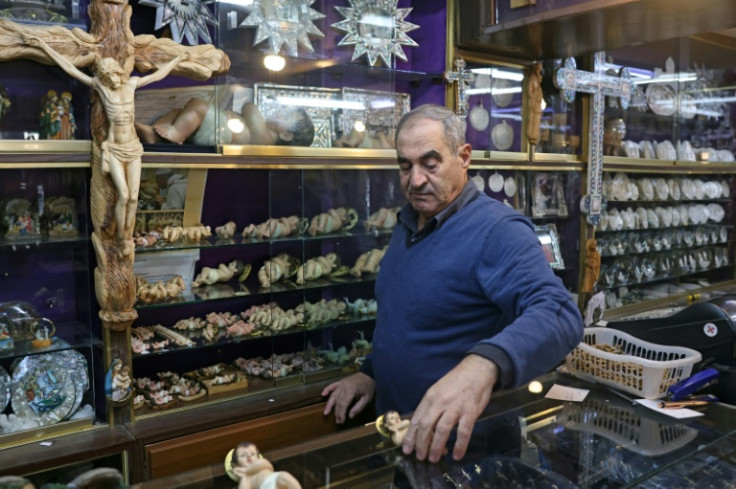In Wartime Bethlehem, Christmas Joy Hard To Find

On Bethlehem's Manger Square, Christmas decorations and pilgrims are notably absent for a second wartime festive season in the Israeli-occupied West Bank city.
The Church of the Nativity that dominates the square is as empty as the plaza outside. Only the chants of Armenian monks echo from the crypt where Christians believe Jesus Christ was born.
"Normally on this day you would find 3,000 or 4,000 people inside the church," said Mohammed Sabeh, a security guard for the church.
Violence across the Israeli-occupied West Bank has surged since the war in Gaza broke out on October 7 last year, but Bethlehem has remained largely quiet, even though the fighting has taken a toll on the now predominantly Muslim city.
Foreign tourists, on whom Bethlehem's economy almost entirely relies, stopped coming due to the war. An increase in restrictions on movement, in the form of Israeli checkpoints, is also keeping many Palestinians from visiting.
"Christians in Ramallah can't come because there are checkpoints," Sabeh said, complaining that Israeli soldiers "treat us badly", leading to long traffic queues for those trying to visit from the West Bank city 22 kilometres (14 miles) away, on the other side of nearby Jerusalem.
Anton Salman, Bethlehem's mayor, told AFP that on top of pre-existing checkpoints, the Israeli army had set up new roadblocks around Bethlehem, creating "an obstacle" for those wanting to visit.
"Maybe part of them will succeed to come, and part of them, they are going to face the gates and the checkpoints that Israel is putting around", Salman said.
The sombre atmosphere created by the Gaza war, which began with Hamas's unprecedented attack on Israel on October 7, 2023, would make showy celebrations an insensitive display, said Salman.
"We want to show the world that Bethlehem is not having Christmas as usual", he said.
Prayers will go on, and the Catholic Church's Latin Patriarch will make the trip from Jerusalem as usual, but the festivities will be of a more strictly religious nature than the festive celebrations the city once held.
There will be no float parade, no scout march and no large gatherings on the streets this year.
"Bethlehem is special at Christmas. It is so special in the Holy Land. Jesus was born here", said Souad Handal, a 55-year-old tour guide from Bethlehem.
"It's so bad (now) because the economy of Bethlehem, it depends on tourism."
Joseph Giacaman, owner of one of Bethlehem's best-located shops right on Manger Square, said he now only opens once or twice a week "to clean up", for lack of customers.
"A lot of families lost their business because, you know, there are no tourists", said Aboud, another souvenir shopkeeper, who didn't give his last name.
Similarly, in Jerusalem's Old City, just eight kilometres (five miles) away but on the other side of the separation wall built by Israel, the Christian quarter has eschewed traditional Christmas decorations.
The municipality has forgone its traditional Christmas tree at the main entrance to the neighbourhood, New Gate, and nativity scenes have been restricted to private properties.
The tightening of security around Bethlehem since the start of the war, combined with economic difficulties, has led many local residents to leave.
"When you can't offer your son his needs, I don't think that you are going to stop just thinking how to offer it", said Salman, the mayor.
Because of that, "a lot of people, during the last year, left the city", he said, estimating that roughly 470 Christian families had moved out of the greater Bethlehem area.
However, the phenomenon is by no means restricted to Christians, who represented around 11 percent of the district's about 215,000 inhabitants in 2017.
Father Frederic Masson, the Syrian Catholic priest for the Bethlehem parish, said that Christians and non-Christians alike had been leaving Bethlehem for a long time, but that "recent events have accelerated and amplified the process".
In particular, "young people who can't project themselves into the future" are joining the exodus, Masson said.
"When your future is confiscated by the political power in place... it kills hope", he said.
Echoing Father Masson, Fayrouz Aboud, director of Bethlehem's Alliance Francaise, a cultural institute that provides language courses, said that in current times "hope has become more painful than despair".
With Israeli politicians increasingly talking of annexing the West Bank, she said many young people come to her to learn French and build skills that would allow them to live abroad.
Even her own 30-year-old son has raised the idea, telling her: "Come, let's leave this place, (the Israelis) will come. They will kill us".

© Copyright AFP 2025. All rights reserved.





















